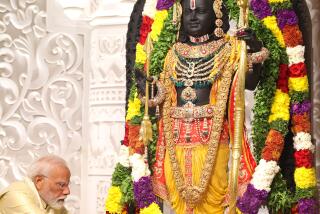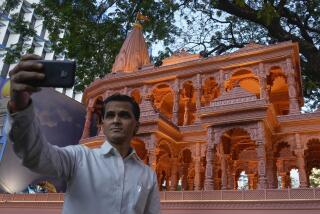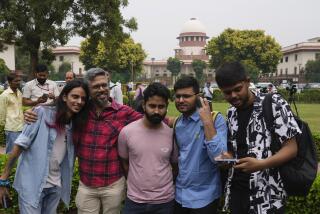Indian court divides Babri Masjid site between Hindus and Muslims
Reporting from New Delhi — In a long-awaited decision that raised fears of sectarian violence, an Indian high court ruled Thursday that a disputed religious site tied to deadly rioting in the early 1990s should be divided between Hindus and Muslims.
As the complex decision was announced, India hoped it had moved beyond the religious violence of a generation ago, when a mosque at the site was destroyed, sparking riots that left 2,000 dead. Hours after the verdict, there were no immediate reports of unrest amid heavy security.
The majority in a three-judge panel made up of two Hindus and one Muslim accepted the argument of Hindu plaintiffs who said the land on which the 16th century mosque had stood was the birthplace of one of Hinduism’s most revered gods, Ram.
It also concluded that a Hindu temple had been destroyed to build the mosque, a contention that independent historians and archaeologists question.
In a compromise move, however, the court awarded one-third of the 2.7-acre site to Muslims.
At its heart, the ruling seemed more like a political than a legal decision, analysts said, offering a potential approach for both faiths to share the site.
Included in the decision were guidelines for dividing the land in such a way that both sides can use it, with exits and entrances laid out to avoid disturbances. Further complicating any settlements, two of the Hindu plaintiffs aren’t necessarily in agreement and could opt to build different temples on the site.
“It’s a flawed judgment,” said Amulya Ganguli, a political analyst. “It accepts what’s there and doesn’t want it undone given the [political] complications. The fact that’s most welcome, though, is that all sides seem to accept it, showing that we’ve moved on from 1992. No one wants more sectarian violence.”
The Muslim side said it would appeal the ruling to the Supreme Court. Given India’s creaky legal system and fears of communal violence, the 60-year-old case could drag on for a decade or more, legal experts said.
“I am partly disappointed,” Zafaryab Gilani, a lawyer for the Muslim side, told local news channel NDTV. “I don’t know how the court came to this conclusion.”
In a scene bordering on chaos, about 500 reporters mobbed lawyers emerging from the courthouse after the decision was announced, as a helicopter circled overhead and Hindu attorneys flashed victory signs.
Different teams of attorneys then spent 30 minutes trying to outshout each other at a makeshift media center before the broad outlines of the judgment became apparent.
At issue in the 2-to-1 decision is a piece of land in the northern Indian town of Ayodhya, 350 miles east of New Delhi, which for more than four centuries was the site of the Babri Masjid. In 1949, police reports show, a group of Hindus sneaked into the mosque and planted several Hindu idols, which believers then hailed as a miracle.
Then in late 1992, extremist Hindus razed the mosque, claiming that a Hindu temple had been destroyed to make way for the mosque in 1528.
The destruction sparked a wave of sectarian violence even as Hindu groups vowed to build a “glorious” temple to Ram on the site. That didn’t happen, though a small tent-shrine set up there remains in place today.
The court gave ownership of the site of the makeshift shrine to Hindus. It also ruled that the status quo should be maintained for three more months so the land can be peaceably measured and divided.
Some questioned the court’s decision to effectively validate the Ram idols left in the mosque in 1949.
“That’s an illegal act of incursion that’s now been legalized,” Ganguli said. “The danger is that anyone can plant something in someone else’s house and claim it. To accept ownership just because the idols are there is something a law court shouldn’t endorse.”
Kamini Jaiswal, a legal analyst, told local journalists that the court had exceeded its mandate. “There has to be some evidence for a decision,” she said. “How can you decide on people’s faith?”
The government had appealed for calm in anticipation of the controversial decision but braced for the worst, positioning rapid-response security teams and hundreds of thousands of police officers around the country, arresting more than 10,000 people in a preventive move to deter violence and temporarily blocking bulk-scale messaging on cellphones.
Shortly after the ruling was announced, Prime Minister Manmohan Singh urged people to maintain India’s secular, tolerant traditions.
“You should be particularly careful with regard to rumors that disruptive elements could propagate to create ill will between communities,” he said in a prepared statement.
Anshul Rana in The Times’ New Delhi Bureau contributed to this report.
We tell you what’s happening, when it happens, for FREE:
| Sign-up for Breaking News Mobile Text Alerts: Text NEWS, WEATHER or TRAFFIC to 37798 | |
| Subscribe to our Breaking News E-mails | |
| Try the News@3 Newsletter |
More to Read
Sign up for Essential California
The most important California stories and recommendations in your inbox every morning.
You may occasionally receive promotional content from the Los Angeles Times.










